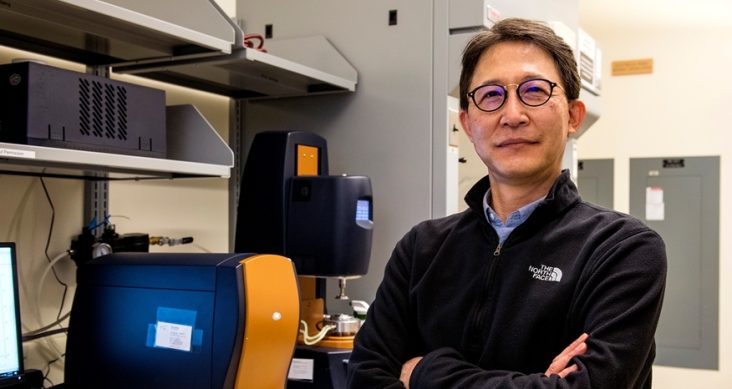Jin-Woo Kim named a fellow with Institute of Electrical and Electronics Engineers
by January 25, 2022 2:21 pm 510 views

Jin-Woo Kim, a professor and researcher with the Arkansas Agricultural Experiment Station, has been inducted as a fellow of the Institute of Electrical and Electronics Engineers for his contributions to nanotechnology.
A professor of biological and agricultural engineering for the experiment station, the research arm of the University of Arkansas System Division of Agriculture, and the University of Arkansas College of Engineering, Kim has devoted much of his career to developing advanced nanoparticle systems into practical tools for medical, agricultural and manufacturing uses.
Kim received fellow status for his contributions to nanoscale fabrication of bio/nano-hybrid materials. The IEEE is a professional organization for the advancement of technology with more than 400,000 members in over 160 countries. Only about 5,000 members have been named fellows. Kim was among 311 senior members bestowed with the honor in 2022.
“We congratulate Dr. Kim for his induction as fellow of IEEE,” said Jean-François Meullenet, senior associate vice president for agriculture-research and director of the Arkansas Agricultural Experiment Station. “We know this is a very special honor for him and a great recognition for his breakthrough work in nanoscience. Well deserved.”
“It is a prestigious honor and an important career achievement,” said Lalit Verma, head of the Department of Biological and Agricultural engineering. “Dr. Kim’s research and development work and innovative technology will enhance the economic well-being and quality of life in Arkansas and the world.”
Kim’s contributions to nanotechnology have helped develop a method to treat cancer in collaboration with the University of Arkansas for Medical Sciences.
“I have found him to always be an innovative, deep thinker and someone with a special ability to think across disciplines as he collaborates on exciting work related to our cancer detection and drug delivery interests,” said Robert J. Griffin, Ph.D., of the UAMS Department of Orthopedic Surgery. “His work on DNA-based nanoparticles was particularly fascinating as he was able to ingeniously use the natural properties of DNA to create multi-functional nanomaterials with exciting potential.”
Verma said Kim’s work with nanoparticles has the potential to transform many fields of research, ranging from optoelectronics, nanophotonics, and nanomedicine to agriculture, food safety and biosecurity. Kim has been developing innovative technology to guide the self-assembly of nanoparticles into specific shapes and functions that he calls “nano-toolbox technology.” He has also used the technology to investigate the applications of nanocellulose created from timber industry waste.
